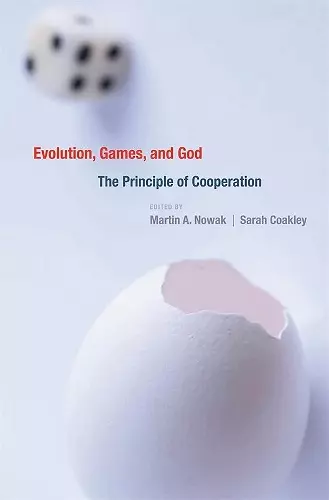Evolution, Games, and God
The Principle of Cooperation
Sarah Coakley editor Martin A Nowak editor
Format:Hardback
Publisher:Harvard University Press
Published:6th Jun '13
Should be back in stock very soon

According to the reigning competition-driven model of evolution, selfish behaviors that maximize an organism’s reproductive potential offer a fitness advantage over self-sacrificing behaviors—rendering unselfish behavior for the sake of others a mystery that requires extra explanation. Evolution, Games, and God addresses this conundrum by exploring how cooperation, working alongside mutation and natural selection, plays a critical role in populations from microbes to human societies. Inheriting a tendency to cooperate, argue the contributors to this book, may be as beneficial as the self-preserving instincts usually thought to be decisive in evolutionary dynamics.
Assembling experts in mathematical biology, history of science, psychology, philosophy, and theology, Martin Nowak and Sarah Coakley take an interdisciplinary approach to the terms “cooperation” and “altruism.” Using game theory, the authors elucidate mechanisms by which cooperation—a form of working together in which one individual benefits at the cost of another—arises through natural selection. They then examine altruism—cooperation which includes the sometimes conscious choice to act sacrificially for the collective good—as a key concept in scientific attempts to explain the origins of morality. Discoveries in cooperation go beyond the spread of genes in a population to include the spread of cultural transformations such as languages, ethics, and religious systems of meaning.
The authors resist the presumption that theology and evolutionary theory are inevitably at odds. Rather, in rationally presenting a number of theological interpretations of the phenomena of cooperation and altruism, they find evolutionary explanation and theology to be strongly compatible.
This is an important volume because it completely subverts the idea that the evolutionary narrative is in some profound sense antithetical to theology. Not so. The ‘selfish gene’ as a metaphor makes no sense of biological realities. Co-operation is here to stay, as important at the level of interacting genes in genomic as it is at the level of interaction between organisms. -- Denis Alexander * Times Literary Supplement *
The book is almost heroically interdisciplinary, touching on everything from brain science, meerkats and slime molds to experimental economics and the theological concept of kenosis (or divine ‘self-emptying’). -- Matthew Reisz * Times Higher Education *
Martin Nowak is undeniably a great artist, working in the medium of mathematical biology. -- Sean Nee * Nature *
A good entry point into the controversial subject of the adequacy of biological explanations of human behavior. -- A. C. Love * Choice *
What makes Evolution, Games, and God so interesting and valuable is that the essays collected here, in addition to providing readable introductions to and discussions of the role of game theory in evolutionary explanation, also provide information and/or considerations relevant to the larger question of whether science is now at the point of providing an exclusively naturalist, and even physicalist, explanation of human tendencies that formerly seemed to require the realities of God and soul. The essays deal in an informed and sophisticated way with this and other related questions, and they do so without the venom that characterizes so many other popular treatments of the question of science, faith and morality. -- John F. Haught, Ph.D., Senior Fellow in Science and Religion, Georgetown University
Evolution, Games, and God is perhaps science and religion at its best: going further than the somewhat stale debate about whether such a discussion is possible by plunging into a specific topic that is in itself changing rapidly and at the cutting edge of scientific analysis. It also brings in, rather more extensively than some volumes, a philosophical perspective that chastens scientific and theological reflection, without compromising the insights that are possible in both fields of study. -- Celia Deane-Drummond, Professor of Theology, University of Notre Dame
I have been anticipating this book for years and it has exceeded my high expectations. Nowak and Coakley combine the courage of applying a specific evolutionary theory to altruism with the prudence of recruiting sharp minds to explore and challenge their own thesis. The result is essential reading for anyone interested in carefully bringing science into conversation with moral and theological phenomena while avoiding the pitfalls of reductionism. -- Ariel Glucklich, Professor of Theology, Georgetown University
ISBN: 9780674047976
Dimensions: unknown
Weight: unknown
416 pages